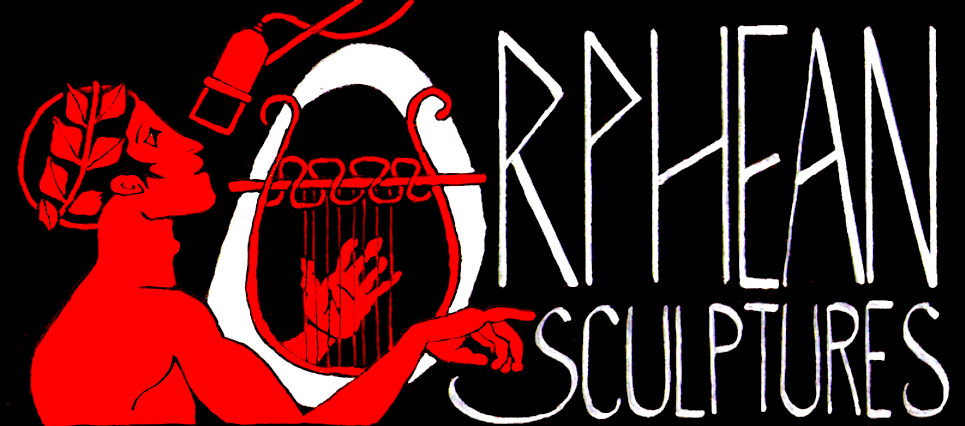ORPHEUS

...so they to the sound of Orpheus' lyre smote with their oars the rushing sea-water... (3)
Then Orpheus plucked his lyre as he sang [to the inhabitants of hell]. The bloodless shades shed tears: they heard his plea the chant the Thracian had accompanied with chords upon his lyre. Tantalus no longer tried to catch the fleeing waves Ixion's wheel stood still - entranced, amazed; the vultures did not prey on Tityus' liver; the Danaids left their urns; and Sisyphus, you sat upon your stone. It's even said that, moved by Orpheus' song, the Furies wept-the only tears the Furies ever shed. Nor could Prosperina, nor he himself, the ruler of the lower world, refuse; the plea of Orpheus of Rhodope. (1)
Yet when the poet, heaven-born, would play, on his resounding lyre [on top of a treeless hill], shade on shade would seek that glade. [every tree then gathers on the hill.] (1)
...and Orpheus lifted his lyre in his left hand and made essay to sing. (3)
And ever on the watch from their [the siren's] place of prospect with its fair haven, often from many had they taken away their sweet return, consuming them with wasting desire and suddenly to the heroes, too, they sent forth from their lips a lily-like voice. And they were already about to cast from the ship the hawsers to the shore, had not Thracian Orpheus, son of Oeagrus, stringing in his hands his Bistonian lyre, rung forth the hasty snatch of a rippling melody so that their ears might be filled with the sound of his twanging; and the lyre overcame the maidens' voices. And the west wind and the sounding wave rushing astern bore the ship on; and the Sirens kept uttering their ceaseless song.(3)
Orpheus is a legendary poet, singer, and lyerist from Thrace, in ancient Grece.
...the Thracian singer sat. He tried the chords: he plucked them with his thumb; and when he heard that, although each note had a different sound, it stood in right relation to the rest, he lifted up his voice... (1)
Such were the songs of Orpheus: with these the Thracian poet charmed the woodland trees and souls of savage beasts; even the stones were held in thrall by Orpheus' tender tones. (1)
Another woman cast a stone [at Orpheus]; but as it cleaved the air, it yielded to the spell of his enchanting voice and lyre: it fell at Orpheus' feet as if compelled to seek forgiveness for its mad audacity. (1)
...In truth, the song of Orpheus could have subdued all of their weapons; but his lyre is drowned by shrieks and caterwauls, the raucous sounds of drums and twisted Berecynthian flutes, bacchantes' pounding hands, and strident howls. (1)
...the countless birds, the serpents, and throng of savage beasts - all who were still spellbound by Orpheus: the trophies he had won, the living proof of his triumphant song. (2);
...Orpheus could Summon up the ghost of his wife, trusting so to his Thracian lyre and echoing strings... (2)
First then let us name Orpheus whom once Calliope bare, it is said, wedded to Thracian Oeagrus, near the Pimpleian height. Men say that he by the music of his songs charmed the stubborn rocks on the mountains and the course of rivers. And the wild oak-trees to this day, tokens of that magic strain, that grow at Zone on the Thracian shore, stand in ordered ranks close together, the same which under the charm of his lyre he led down from Pieria. Such then was Orpheus whom Aeson's son welcomed to share his toils, in obedience to the behest of Cheiron, Orpheus ruler of Bistonian Pieria. (3)
And besides the drink offerings they built an altar to Apollo, saviour of ships, and burnt thigh bones; and Orpheus dedicated his lyre; whence the place has the name of Lyra. (3)
But he [Orpheus], solacing an aching heart with music from his hollow shell, sang of you, dear wife, sang of you to himself on the lonely shore. (7)
And even when the Oeagrian [Thracian] Hebrus rolled in mid current that head, severed from that marble neck, the disembodied voice and the tongue, now cold forever, called with departing breath on Eurydice, - ah, poor Eurydice.(7)
Any girl I'd call accomplished must know how to play a stringed instrument, handle a quill. Orpheus moved rocks and beasts with his lyre, held Tartarus spellboud, tamed Hell's three headed dog...(6)
The tongue of Orpheus is quite the opposite of thine. He haled all things by the rapture of his voice; but thou, who hast stirred our wrath by thy silly yelping, shalt be haled off thyself. (4)
...what good were divine parents to Orpheus? Could the songs that spellbound beast save even him? His father Apollo sang 'Woe forLinos!' (they say) in the wild woods to a reluctant lyre... (5)